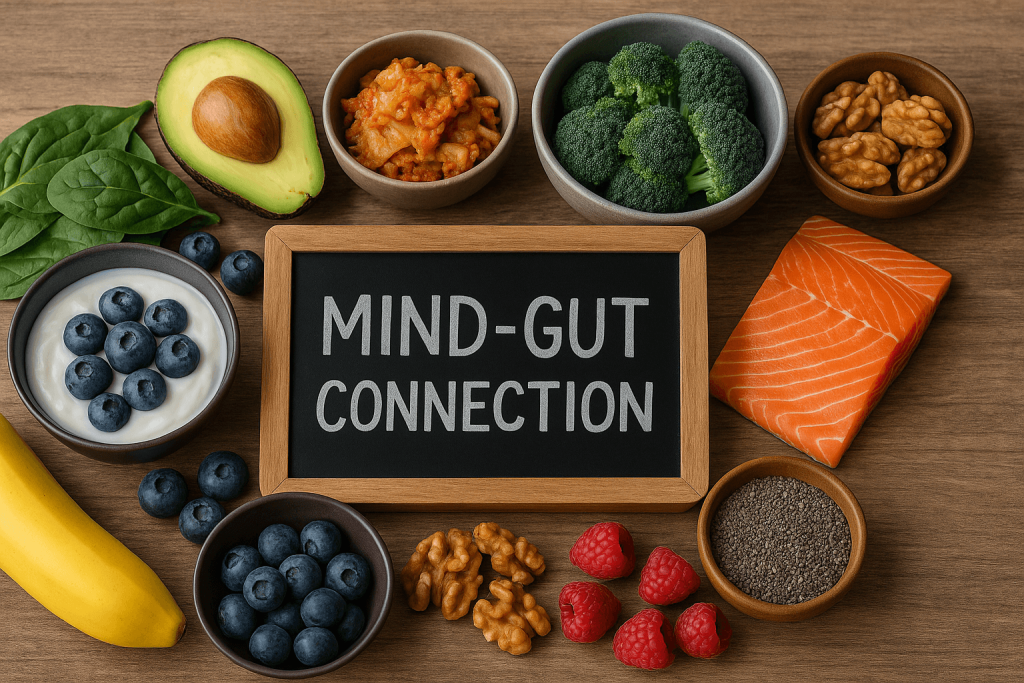The Mind-Gut Connection: How Your Diet Shapes Mental Health

Your gut and your brain are more connected than you might think. The trillions of microbes living in your digestive system — known as the gut microbiome — play a profound role not only in digestion but also in mood, cognitive function, and emotional well-being. This relationship, called the mind-gut connection, has become one of the most exciting frontiers in modern health research.
By supporting your gut health, you can positively influence your mental clarity, stress resilience, and even reduce symptoms of anxiety and depression — all through the power of your plate.
How the Gut and Brain Communicate
The gut and brain are in constant communication through:
✔ The vagus nerve, sending signals between the gut and the brain
✔ Neurotransmitters like serotonin and dopamine — over 90% of serotonin is produced in the gut
✔ The immune system and inflammatory responses
✔ Metabolites produced by gut bacteria that influence mood and cognition
A healthy, diverse gut microbiome supports better mental health, while an imbalanced gut — known as dysbiosis — is linked to:
- Increased anxiety and depression
- Brain fog and poor focus
- Chronic stress response
- Weakened immune function
Dietary Habits That Harm the Mind-Gut Connection
Certain foods and lifestyle factors damage gut health:
✖ Ultra-processed foods and artificial additives
✖ Excess sugar and refined carbohydrates
✖ Overuse of antibiotics or medications that disrupt gut flora
✖ Chronic stress and poor sleep
✖ Low fiber intake
These disrupt the balance of beneficial bacteria, increase inflammation, and compromise both gut and brain function.
Foods That Nurture Your Gut and Your Mind
1. Prebiotic-Rich Foods
Feed the good bacteria in your gut:
- Garlic, onions, leeks
- Bananas (especially slightly green)
- Asparagus, chicory root, Jerusalem artichokes
- Oats, barley
2. Probiotic Foods
Introduce beneficial live cultures:
- Yogurt with live and active cultures
- Kefir (dairy or plant-based)
- Sauerkraut, kimchi, pickles (fermented naturally)
- Miso, tempeh
3. Polyphenol-Rich Foods
Antioxidants that fuel gut bacteria and reduce inflammation:
- Berries, dark chocolate, green tea
- Olive oil, nuts, and seeds
4. Omega-3 Fatty Acids
Support brain health and reduce inflammation:
- Fatty fish (salmon, sardines)
- Algae oil (plant-based source)
- Walnuts, flaxseeds, chia seeds
5. Fiber from Whole Plants
Diverse fibers encourage a diverse microbiome:
- Legumes, vegetables, fruits, whole grains
Gut Health and Mental Well-Being: The Evidence
✔ People with diverse, healthy gut microbiomes show better mood regulation
✔ Probiotics may reduce symptoms of depression and anxiety (research ongoing)
✔ Fiber-rich diets are linked to lower stress and better cognitive function
✔ Chronic gut inflammation is associated with cognitive decline and mood disorders
While gut health isn’t a standalone cure for mental health challenges, it plays a powerful supportive role.
Simple Habits for a Healthier Mind-Gut Connection
✔ Eat a variety of plant-based, whole foods
✔ Incorporate fermented foods daily
✔ Reduce ultra-processed and high-sugar foods
✔ Stay hydrated to support digestion
✔ Manage stress with mindfulness, exercise, and sleep
✔ Consider targeted probiotic supplements if needed
Conclusion: Feed Your Gut, Fuel Your Mind
Your gut is more than a digestive system — it’s a critical part of your emotional and cognitive health. By nourishing your microbiome with the right foods and habits, you lay the foundation for sharper focus, improved mood, and greater resilience.
Better gut health isn’t just about digestion — it’s about living with more clarity, energy, and balance, from the inside out.



